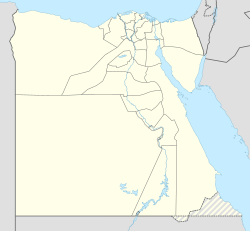Letopolis (Greek: Λητοῦς Πόλις) was an ancient Egyptian city, the capital of the second nome of Lower Egypt. Its Egyptian name was Khem 𓋊𓐍𓐝𓂜𓊖𓉐 (ḫm),[2] and the modern site of its remains is known as Ausim (Arabic: اوسيم, from Coptic: ⲟⲩϣⲏⲙ, ⲃⲟⲩϣⲏⲙ).[3][4][5] The city was a center of worship of the deity Khenty-irty or Khenty-khem, a form of the god Horus. The site and its deity are mentioned in texts from as far back as the Old Kingdom (c. 2686–2181 BC), and a temple to the god probably stood there very early in Egyptian history. The only known monuments at the site, however, date to the reigns of pharaohs from the Late Period (664–332 BC): Necho II, Psamtik II, Hakor, and Nectanebo I.[6][4]
Letopolis
Λητοῦς Πόλις ⲟⲩϣⲏⲙ, ⲃⲟⲩϣⲏⲙ اوسيم | |
|---|---|
| Coordinates: 30°07′N 31°08′E / 30.117°N 31.133°E | |
| Country | Egypt |
| Area | |
• Total | 72.41 km2 (27.96 sq mi) |
| Population (2021)[1] | |
• Total | 415,735 |
| • Density | 5,700/km2 (15,000/sq mi) |


In popular culture
editLetopolis is depicted in the 2017 video game Assassin's Creed Origins,[7] set during the Ptolemaic Era of Egypt.[8]
See also
editReferences
edit- ^ a b "Awsīm (Markaz, Egypt) - Population Statistics, Charts, Map and Location". citypopulation.de. Retrieved 17 March 2023.
- ^ Miriam Lichtheim, Ancient Egyptian Literature Vol. III: The Late Period, Berkeley 1980, p.84
- ^ Peust, Carsten. "Die Toponyme vorarabischen Ursprungs im modernen Ägypten" (PDF). p. 16.
- ^ a b Snape, Steven (2014). The Complete Cities of Ancient Egypt. Thames & Hudson. p. 185. ISBN 978-0-500-77240-9.
- ^ "Trismegistos". www.trismegistos.org. Retrieved 2018-02-26.
- ^ Wilkinson, Richard H. (2000). The Complete Temples of Ancient Egypt. Thames & Hudson. p. 111
- ^ Hillier, Brenna (30 October 2017). "Assassin's Creed Origins: find the Temple of a Million Years in The New Kid in Town". vg247. Gamer Network. Retrieved 15 August 2019.
- ^ Cryer, Hirun (24 September 2018). "Assassin's Creed Origins The New Kid in Town Quest - How to Find the Temple of a Million Years". US Gamer. Archived from the original on 10 August 2020. Retrieved 15 August 2019.
